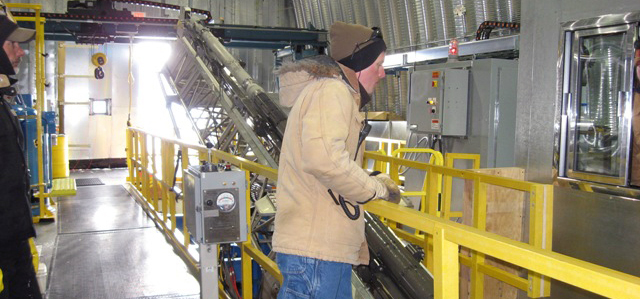News
Field and CPL Updates
2008-2009 Antarctica

We are now in the home stretch of the field season. The current depth is 1360 meters and the core quality is excellent. Plots of core quality verses depth show that we reached a nadir of poor quality brittle ice at approximately 1070 meters, and it has been getting better ever since. On Thursday January 15 at depth of 1320 meters we attempted our first full run of obtaining a ~2.5 ice core with no down-hole breaks. This involved altering our logging methods slightly to accommodate cutting the core into 1-meter maximum length pieces with our chop-saw. It was very successful, yielding a smooth and transparent cut on the ice allowing close investigation that shows we still have small air bubbles (~0.25 - 0.5 mm diameter) and while one cannot say we are totally out of the brittle ice, it is certainly much easier to handle and our chop-saw cuts are much preferred to the down hole dog-breaks. The electrical measurements are going well and show strong annual layering that will make it easy to determine the age of the ice.
We are on target for filling all of our core trays with ice and reaching our goal of >1,500 meters depth by the last day of drilling, Friday January 23rd. Beginning today, drillers will begin to experiment with several different methods for increasing the length of ice core obtained from each run. Bill Mason has designed and fabricated some snap-valves that will be installed to help channel the flow of drilling fluid to allow dense-packing of the upper screen sections sequentially. It is critical that we give ICDS enough drilling-days to adequately test these methods. After the last day of drilling, the new cable will be spooled on the winch and could take several days.
The weather here at WAIS Divide has continued to be far better than last season, with no major storms to report in the last week. However, our winds and limited visibility combined with aircraft mechanical problems have limited the number of flights that we have been able to land this week. We have zero flights since Tuesday January 13, and we have been told that at least 3 of the LC-130s on continent are out of service with mechanical issues. South Pole has been short on fuel and AGAP is closing down. This combination of large demands on limited supply of aircraft is causing great uncertainty in forecasting movements of both cargo and passengers to and from WAIS. Fuel on site is approximately 6,000 gallons, and it is expected that we could leave at least 8,000 gallons on site for next year. Much cargo is palletized and awaiting shipment.
Other activities: CReSIS team (I-188 and I-205 Sridhar et al.) remains in town, waiting for a flight out. Sylvan Masclin (I-151) has completed his atmospheric sampling work, is packed up and also awaiting a flight. A safety meeting was conducted Saturday afternoon, and at 3 PM we suspended our work for a day for a much-deserved break after a 17-day stretch of round-the-clock shifts. Brian Bencivengo orchestrated an evening sleigh ride (a CReSIS sled towed behind a Tucker at ~ 2 mph) that provided a forum for a welcome diversion that included music, dancing, snow balls, cartwheels, group photos, human pyramid building and general carrying on. All had a good, safe time. This will be the last such time-off for the season, because once we start taking things down, there will be a steady march to load and go, as planes become available. On Sunday, there was another WAIS Coffee House performance, including comedy improv, music and story telling. As we pace ourselves for the home stretch, it is comforting to know that we really are community in the greatest sense and the camp remains a strong, capable group, in good spirits.
Passenger movements: Tuesday January 13, 5 passengers departed: Anais Orsi (SCO), Michael Jayrad (CRESIS), 3 RPSC employees: Kelly Jacques, the Environmental Representative from McMurdo, Dave the heavy equipment mechanic, and Andrew Kirby, carpenter. One passenger arrived: Teresa Tran ("T") our camp supervisor. Expected this coming week are visits from both NSF and RPSC.
Cheers,
Bruce H. Vaughn

